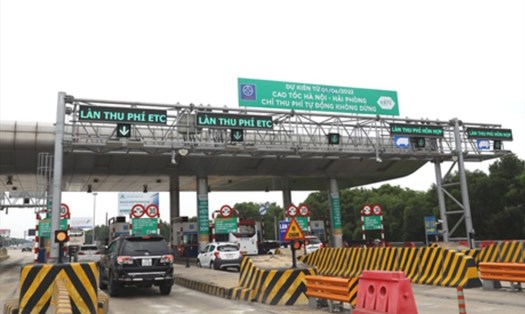On August 14, Construction Newspaper organized a workshop: Why do drivers need to have a traffic account from October 1?
Informing at the workshop, a representative of the Ministry of Construction said that recently, toll service providers have used different names for toll accounts and traffic accounts, causing misunderstanding about converting toll accounts into traffic accounts connected to non-cash payment vehicles.
To simplify, vehicle owners only need to check if they have used the VETC Wallet (for vehicle owners using VETC services) or are linked to the Viettel Money wallet (for vehicle owners using Epass services), then the vehicle owner has completed the account conversion.
If not, the vehicle owner must convert the toll collection account by using the service provider's application to create or connect to the vehicle owner's non-cash payment method (ie e-wallet, credit card), specifically:
For vehicle owners using VETC services: create a VETC wallet and connect the VETC wallet to a toll collection account (or traffic account) on the application.
For vehicle owners using Epass services: create a Viettel Money wallet and connect to an Epass account on the application.
In addition, from September 1, 2025, vehicle owners using Epass can connect to Momo e-wallet, Vnpay, and Visa credit card.
The representative of the Ministry of Construction also said that in order to implement the non-stop collection of electronic fees, in the recent past, vehicle owners have been granted fee collection accounts by toll service providers (including vehicle owner information, vehicle information, and money entered by vehicle owners to pay road use fees at road toll stations).
The toll collection account is an account managed by the Ministry of Transport (now the Ministry of Construction), so according to the law, banks can only use it to pay road fees at road toll stations, not used for other purposes such as paying for airport parking fees, bus stations, urban parking fees...; at the same time, vehicle owners cannot withdraw the remaining money from the toll collection account.
In order to expand payment services on the non-stop electronic toll collection system platform, at the same time, to solve limitations in money management in toll collection accounts.
During the process of developing the Road Law, the Ministry of Transport (now the Ministry of Construction) worked with the State Bank and agreed to separate the toll collection account into a traffic account (including vehicle owner information, vehicle information managed by the Ministry of Construction) connected to a non-cash payment method (the source of vehicle owners' money to pay road use fees at road toll stations managed by the State Bank).
These contents have been stipulated in Article 43 of the Road Law and Decree No. 119/2024/ND-CP dated September 30, 2024 of the Government regulating electronic payments for road traffic.
According to the new regulation, vehicle owners use a traffic account to connect to a non-cash payment method to make payments for many services through a non-stop electronic toll collection system (also known as the electronic payment system for road traffic according to the new regulation) such as paying road fees at road toll stations, paying airport parking fees, bus stations, and urban parking fees.
In the coming time, traffic accounts can pay for inspection fees, gasoline, electric charging for electric vehicles...
The Road Law and Decree No. 119/2024/ND-CP require vehicle owners to convert toll collection accounts to traffic accounts connected to non-cash payment vehicles between October 1, 2024 and September 30, 2025.
From October 1, 2024 to September 30, 2025, vehicle owners can pay road use fees from toll collection accounts or non-cash payment means from October 1, 2025. If the vehicle owner has not made the conversion, there will be no money to make the payment, so they will not be able to circulate through non-stop electronic toll lanes at road toll stations.









